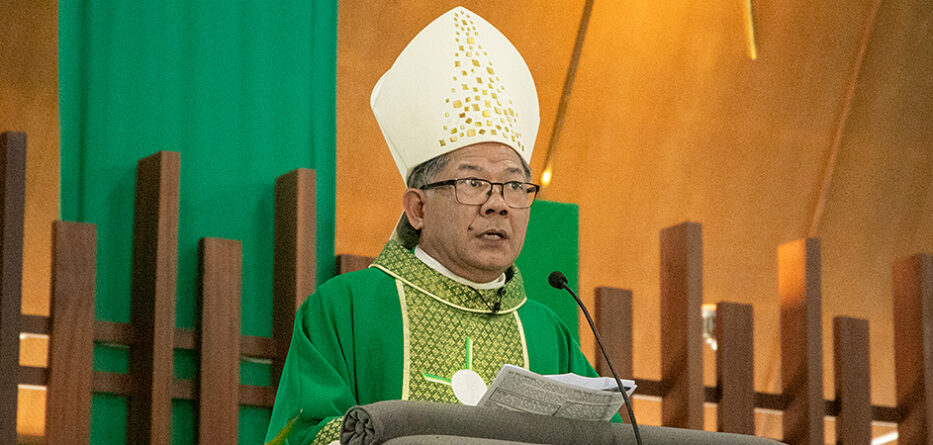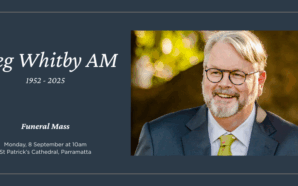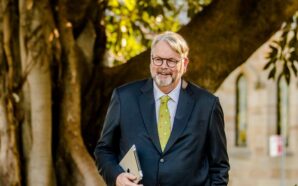Most Reverend Vincent Long Van Nguyen OFM Conv DD STL, Bishop of Parramatta
Homily for the 22nd Sunday of Ordinary Time Year C and the Commissioning Mass of the Diocesan Jubilee of Hope Adult Pilgrimage at St Anthony of Padua Parish, Toongabbie
Readings: 1 Sirach (Ecclesiasticus) 3:19-21,30-31; Psalm 67 (68):4-7, 10-11; Hebrews 12:18-19, 22-24A; Luke 14:1, 7-14
31 August 2025
Welcoming those who are rejected by others
Dear friends,
Eating with someone and especially sitting near someone can be an expression of solidarity and friendship. I once had the privilege of sitting next to Pope Francis at a dinner table in Rome. I was in awe of him. Here was the most revered person in the world. Yet, he struck me as being so humble, down-to-earth, without airs and graces. He even poured wine into my glass and toasted me.
But then, Pope Francis was also well-known for eating with the poor. Every year, he would host a meal with the down and out in Rome. It became a fixture in the Church’s universal calendar, known as the World Day of the Poor, which we also celebrate in our own diocese. The late Pope, perhaps more than any of his predecessors, modelled a Church of humility, service and closeness with people on the periphery. Whether it was the street feast with the homeless, the washing of the prisoners’ feet or the welcoming of undocumented migrants, he signalled the Church’s total commitment to the upside-down way of Jesus. The community of disciples welcomes those who are deemed unworthy and rejected by others.
Scriptures for this Sunday teach us that a self-effacing disposition has to be at the foundation of our lives as people of the Good News. The book of Sirach, which contains the pearls of ancient Jewish wisdom exhorts us to conduct our affairs with humility and to humble ourselves even more if we happen to be in positions of power. This teaching is not unique to our Judeo-Christian tradition. Confucius of China said something very similar some 500 years before Christ. Humility, he said, is the solid foundation of all virtues. No wonder, it was the object of spiritual pursuit in all religious traditions.
In the Gospel, Jesus, howeve,r takes humility to a new level. It goes to the very nature of God and what it means to be His people. The world revels in power, privilege and entitlement, whereas God does the opposite. He is a self-emptying God. Jesus, the suffering servant, is the incarnation of a powerless God. He gives us a completely different relational model, one not based on power and status but on humility and service, not on rights and entitlements but on gratuity and goodness. “Everyone who exalts himself will be humbled, and the person who humbles himself will be exalted.” He goes on to challenge his followers to form a community that subverts the worldly criteria of greatness and worthiness.
“When you give a feast,” he says, “invite the poor, the crippled, the lame and the blind”. According to the Old Testament, the crippled, the blind and the lame were not allowed into the temple of the Lord. The assembly of the Israelites was to be composed of people of able-bodied, racially pure and flawless. Jesus, however, announces that he has come to begin a new feast, a banquet where the excluded, the people rejected by everyone, become the first guests. This radical acceptance – a subversion of the old criteria – has not been easily assimilated in the Christian communities. St James testifies to the distinctions and divisions even during the Eucharistic celebration, when the wealthy are honoured while the poor are ignored. Yet, welcoming the rejected remains the key feature of the Church.
Dear brothers and sisters,
We live at a time when there is so much division in our world and our own society. Tensions are high and many are feeling vulnerable. The Word of God today invites us to humble ourselves and walk in the shoes of others. Jesus asks us to join the poor, the crippled, the lame and the blind as our table guests. They are the categories of the unwanted in ancient Israel. As Jesus often did, we too are called to be the companions and advocates of those who are deemed strangers, outsiders and even threats to our sense of security This is what costly, powerless and authentic discipleship is all about.
The parable of Jesus speaks to the great reversal which is at the heart of the reign of God. The lowly are dignified and yet the mighty are cast down. In the Magnificat and the Beatitudes, we find the reign of God manifested in this way. The Church is a living embodiment of this reversal. We host God’s preferential love for the poor. We notice the plight of the oppressed and defend their cause. We raise the human questions of justice, human rights, sufferings and reparations on their behalf.
Today, we commission our Diocesan Adult Pilgrims as they embark on the Jubilee Pilgrimage. Jubilee in biblical tradition is about a reset in favour of freedom, equity, regeneration and alignment with God’s plan. It obliges us to work for a just and viable society for all, including God’s creation. May the pilgrimage be a graced time of renewal, revitalisation and strengthening of the sense of mission.
Let this Jubilee Year be an opportunity for all of us to reset and realign the direction of our lives. As citizens of heaven, we join together in making present “the city of the living God and the heavenly Jerusalem” in the here and now. May our discipleship of humility, selflessness and service to the least bring this to fruition.








